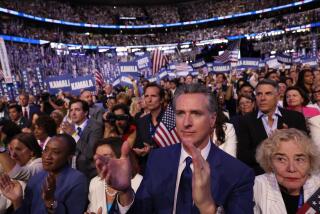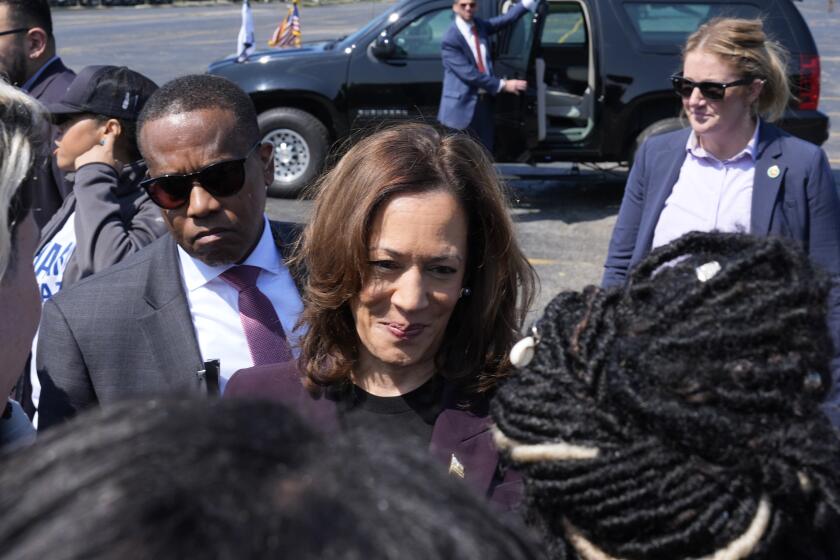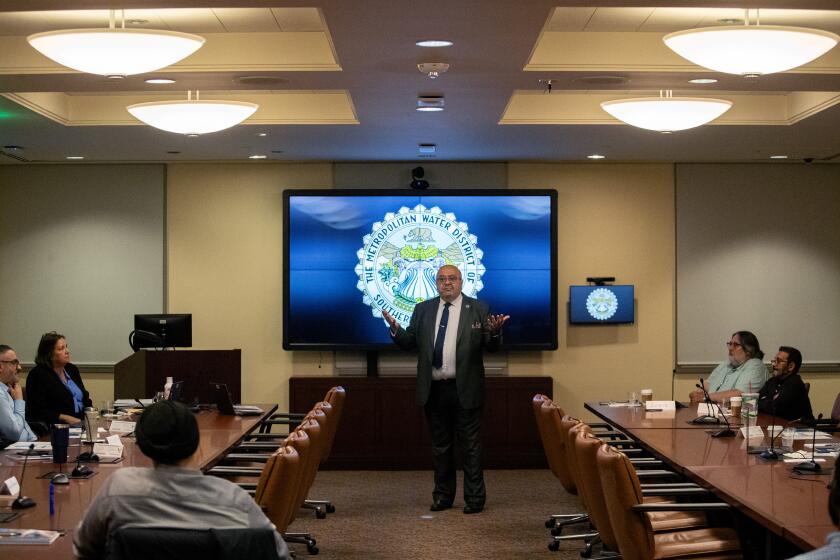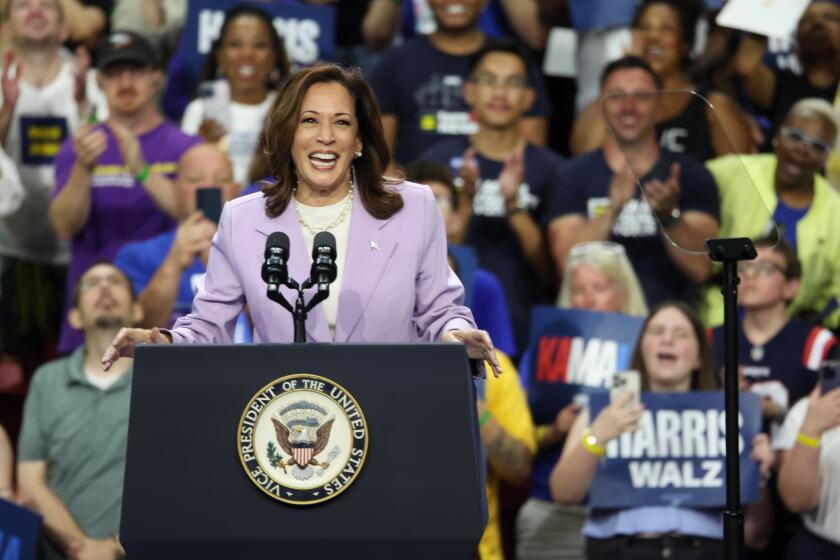Despite Bluffs, Taxes Don’t Push Firms Out of State : Revenue: For decades, the Legislature has given in to threats. Yet levies are not a major cost of doing business.
Shortly after California passed its penny sales tax in 1933, state officials began to fear that Hollywood’s disgruntled movie moguls might do something extreme.
“The state of Florida is very anxious to get the motion picture industry . . . and if we set up a tax on one of their supercolossal $7,000,000 productions, they would no doubt transfer their operations to that state,” one state official wrote after a series of meetings with angry industry representatives.
The result: a 1938 ruling by the State Board of Equalization giving the state’s most glamorous industry a sales tax break on virtually everything but undeveloped film--the first of several major loopholes that have been opened over the years to keep the movie business in California.
So it goes in the world of state and local taxes, where for decades industries and individual businesses have fought taxes by threatening to pack up and head for Mexico, Washington, Nevada, Oregon, New Mexico, Utah, Texas or the Deep South.
Dubbing such threats in 1959 the “counsel of fear,” Gov. Edmund G. (Pat) Brown swept them aside when he called for higher taxes to build highways, universities and aqueducts. And for 40 years, economists have insisted there is little or no evidence that state and local taxes matter much in corporate decisions to relocate, instead representing just one of the many marginal costs that businesses weigh.
Yet the threats have persisted for decades. And they have worked.
In the 1960s, California lawmakers repealed the property tax on inventories after businesses such as Burroughs Corp. warned they would send their stock to warehouses in Nevada.
In the go-go 1980s, legislators relaxed the state’s controversial method of taxing multinational firms based on worldwide payroll--in part because Japanese companies threatened to invest their newfound wealth elsewhere.
Now, in the recessionary 1990s, lawmakers have done it again, passing a bill that will give up to $1 billion in tax breaks over the next four years on everything from new manufacturing equipment to commercial rockets launched from Vandenberg Air Force Base.
The omnibus tax bill, cobbled together in the waning hours of the 1993 legislative session last month, capped a year in which legislators were openly nervous about the state’s newest corporate stars: footloose high-tech and biotechnology firms.
In April, their worst fears appeared to come true when Intel Corp. of Santa Clara, the world’s leading manufacturer of computer chips, announced that it would pass up the Golden State to build a $1-billion fabrication plant expansion in New Mexico. Intel claimed the move would save $130 million in taxes.
Accompanied by strong rhetoric, Intel’s announcement struck a raw nerve in Sacramento, where lawmakers worried about California’s reputation as a tax-plagued state already had introduced an unusually high 89 bills calling for business or individual tax cuts totaling as much as $7 billion--more than twice what is paid to welfare recipients.
Chief among the measures was a bill by Assembly Speaker Willie Brown (D-San Francisco) exempting businesses from paying $1.2 billion in sales taxes on equipment purchases. Although the break was cut in half and its effective date delayed until 1995, it was still the biggest element in the omnibus bill, which Gov. Pete Wilson signed into law Wednesday.
Brown carried the measure for the 800-member California Manufacturers Assn., one of Sacramento’s most powerful lobbying groups. The association argued that without significant tax relief, California would be unable to stem what they contend is an exodus of employers willing to take their $12- to $27-an-hour factory jobs to other states--25 of which exempt business purchases of equipment from their sales taxes.
Business groups such as the San Joaquin Valley’s poultry farmers picked up the beat, saying they too were feeling a bit of wanderlust--a condition that could be cured if the Legislature came through with a $600,000 sales tax break on the rice hulls used as “chicken litter” in their barns.
California, they argued, was the only poultry state that taxed the hulls, which are converted into fertilizer after soaking up chicken and turkey droppings. The tax contributed to high production costs that have run two Louis Rich turkey processing plants out of the state, the farmers claimed.
“The Legislature not approving something like this would send a tiny signal to the poultry industry that . . . they don’t care whether they remain in California or not,” said Bill Mattos, president of the California Poultry Industry Federation in Modesto.
The Legislature passed the bill, and Wilson signed it last month. Gov. George Deukmejian vetoed a similar measure in 1987, citing his concern about opening new loopholes in the tax code.
Notwithstanding the latest rush to grant tax relief, some old hands in the Capitol pooh-pooh talk of business defections. Sen. Nick Petris (D-Oakland), who chaired a legislative tax committee in the 1960s, accuses businesses of “either lying or exaggerating” when they blame taxes for hard times or relocations.
“When I was chairman, I checked out every one of those (claims), and 90% of them turned out to be phony,” said Petris, a blunt 34-year legislative veteran. “The public reasons for leaving are very often not the true reasons.”
Lenny Goldberg, lobbyist for the labor-backed California Taxpayers Reform Assn., which opposes most business breaks, said: “It’s the blackmailing of California.”
There is reason for skepticism. Economic research over four decades has concluded that state and local taxes play, at most, a minimal part in corporate decisions to move. That view is shared by the Federal Reserve Bank of San Francisco, the Council of State Governments, a New York state tax commission, the National Conference of State Legislatures and the Multistate Tax Commission.
Studies indicate that state and local taxes amount to only 1% to 2% of a company’s operating expenses. They are further discounted when either deducted as a business expense against a firm’s much larger federal tax bill--which reduces $1 in state tax to about 66 cents--or depreciated over time as part of the cost of assets.
In California, a key part of the business tax burden--the take from the bank and corporate income tax--has not expanded in six years, since well before the recession hit or the business community began warning loudly about jobs leaving the state.
Since 1987, when the corporate tax rate was lowered to 9.3% from 9.6%, tax collections from California companies have remained flat, about $4.9 billion annually. Over the same period--which included both a tax cut and then a corresponding tax hike for high-income residents--income tax collections from individuals have risen nearly 22%, to $16.9 billion, state figures show.
Economists say there are more important reasons for companies to relocate than taxes: wages, workers’ compensation or housing costs, the availability of an educated work force, transportation costs, utility rates, the cost of land, the quality of schools, permit fees and the expense of regulatory compliance.
Even some who believe that taxes prompt corporate defections downplay their impact. Ernest J. Dronenburg, a Republican member of the State Board of Equalization who is recognized nationally as a state tax expert, says “taxation has been one of the pawns” in an age of fierce economic competition among states.
“I use the term pawn because I don’t see it as a knight or a castle or a major piece but one of the ones that are thrown in,” he said.
Daphne A. Kenyon, an economist at Simmons College in Boston, said sophisticated statistical models have shown some link between business relocations and state and local taxes, but only in a small number of cases where other major costs do not vary from state to state.
“We used to think it was a complete myth,” Kenyon said about corporate threats to move because of taxes. “Now, we don’t think it’s a myth, but it’s probably vastly overblown in legislative discussions.
“It’s easier to lower taxes than to get at something like excess regulation,” Kenyon said. “You can lower taxes in one bill and get that overnight, but if the government is making you fill out all these forms and go through all these hoops, that is much tougher (to correct). In some cases, business goes for what it can get rather than what’s most important.”
Martin Louy--manager of state and local taxes for GenCorp, the Ohio conglomerate that owns Aerojet General, with operations in the Southland and Sacramento--agreed that corporations often make taxes the “whipping boy” in what he called a “dangerous game” of pitting state against state for tax concessions.
“I can paint it any way I want,” said Louy, a member of the CMA’s tax steering committee. “I can play up the taxes that are higher in California than in Ohio, and I can do it the other way.”
Meanwhile, politicians and the public have no way of verifying the claims about taxes made by businesses that threaten to leave. Although public corporations are obliged to report to the Securities and Exchange Commission the total amount of state taxes they pay each year, they do not have to break down the payments by jurisdiction. A bill by Sen. Tom Hayden (D-Santa Monica) requiring companies to do that for California was killed this year.
Without such a prod, firms seldom are willing to volunteer their tax numbers. All but one of the 30 companies contacted by The Times, either individually or through the CMA, declined to disclose their tax burden or the percentage of their operating costs that taxes represented. Those contacted included Intel, Apple Computer, Owens-Illinois Inc., GenCorp, Genentech and TRW.
The reason cited by many of the 30 firms was fear of giving away secrets to competitors.
What is left, legislators say, is a battle of perception. And the CMA, California Chamber of Commerce, Business Roundtable and Southern California Edison, among others, have been aggressively advancing the view that something must be done to change California’s reputation as a high-tax state with a hostile business climate.
As proof, these groups point to a survey done last year for Edison and other California utilities that tracked 1,035 firms that either moved or expanded outside the state since 1980. While 44% of the firms blamed the high cost of workers’ compensation for the move, complaints about state and local taxes came in second, at 32%-34%.
Yet when The Times contacted 23 firms that moved more than 17,000 total jobs out of Southern California during the last three years, the number blaming taxes was far lower. Only one--the Focus on the Family broadcast ministry--said taxes played a major role in its decision to relocate from Pomona to Colorado Springs.
The firms--selected from a list provided by the CMA--included General Motors, which closed its Van Nuys assembly plant; Bank of America, which moved its credit card processing center from Pasadena to Phoenix; American Airlines, which moved its reservation center from El Segundo to Tucson, and shrinking aerospace giants such as Hughes, Lockheed and Allied Signal.
Carter Hawley Hale, parent of the Broadway department store chain, knew its taxes would go down when it moved 600 employees from its credit card processing center in Anaheim to Tempe, Ariz., a spokesman said. But the savings were “just a drop in the bucket” and did not dictate the decision, he added.
“We’ve never made a decision to move work based on taxes,” said a spokesman for Douglas Aircraft Co. in Long Beach. “It’s part of the equation. But it’s a small part when you take into account the other things that drive costs in this state--workers’ comp, environmental permitting and . . . the high cost of attracting employees to this state.”
Even one of the New Mexico officials who worked 18 months to lure the new Intel plant to a site near Albuquerque said that deal turned less on tax breaks than on the company’s ability to get the plant up and operating quickly. Besides New Mexico and California, Intel was considering sites in Texas, Utah, Oregon and Arizona.
Intel employees working at the company’s two existing New Mexico plants figured out a way to “ramp up” the proposed $1-billion facility in about a year--six to eight months quicker than the lead time required at other sites, said Mark Lautman, president of the Rio Rancho, N.M., economic development corporation. That helped tip the balance in New Mexico’s favor because a matter of months is crucial to gaining market share in the fast-paced computer industry, he said.
Lautman added that New Mexico’s tax advantages over California were “blown out of proportion” in the Intel move because of the sheer size of the company’s investment.
“The companies that are moving here . . . they’re not moving here because of the tax climate,” he said. “If you use Intel as an example, your Legislature may get the wrong idea. It may tell you why you lost Intel, but it won’t tell you what is wrong with California.”
Intel officials maintain that the $130 million in tax savings clinched the deal for New Mexico to get the plant’s 1,000 new jobs. “California was very simply outbid. That simple,” said Robert H. Perlman, Intel’s vice president for tax, licensing and customs. “Somebody showed us a more attractive package.”
New Mexico does not charge sales tax on new equipment, an estimated savings for Intel of $55 million, Perlman said. Intel will pay no property taxes in New Mexico because its plant is being financed with Sandoval County industrial revenue bonds, then leased back to the chip-maker for 30 years.
Looking at the tax savings and the decline in California’s quality of life, Perlman said there were not enough “subjectives” to justify spending the extra money.
“Why pay that entry fee?” he said. “And that’s what I think the folks in Sacramento are beginning to understand--that it is a race and there are competitors.”
Indeed, the message grabbed the attention of Sacramento officeholders, from Wilson on down. Even before this year’s Intel decision, the governor acknowledged that the $7-billion tax increase he pushed for in 1991 was a “mistake” and warned in his 1992 State of the State address that California was in “sharp competition with other states and other nations that tax a lot less than we do.”
“If we are to create jobs, we’ll have to cut taxes,” he declared.
Liberal Democrats joined the tax-cut fold as well. Brown, who has opposed business tax cuts in the past, allied himself with the CMA after hearing corporate complaints during his Los Angeles economic summit in February.
Meanwhile, Controller Gray Davis proposed negotiating “tax credit contracts” with companies. As with similar contracts in Ireland or Singapore, companies that failed to keep a certain number of employees or make threshold investments in California would be forced to pay back the incentives. The measure did not pass.
A team of Assembly Democrats sponsored a measure that would make permanent a tax credit companies can receive for research and development--the heart of high-tech and biotechnology. Wilson signed the bill into law last week.
Assemblyman John Vasconcellos (D-Santa Clara), leader of the Democrat team, said he has become convinced that business threats are real this time. As chairman of the Assembly Ways and Means Committee--and as assemblyman for the district that includes Intel’s headquarters--Vasconcellos said his traditional skepticism vanished in the course of 85 meetings with business leaders since January, 1992, to develop economic strategies.
“There was a time when it didn’t (seem believable),” Vasconcellos said, “but it appears to hold water now.”
On a visit this summer to the Capitol, Intel Chairman Gordon Moore said the computer giant would be watching to see if lawmakers have gotten the message.
“We’ll be committing another major plant by the end of this year,” Moore said. “Should California be considered or not? . . . California has to decide if it wants to compete.”
Times researcher Nona Yates contributed to this story.
Powerful Voices in the California Tax System
These are some of the people who have a major impact on California tax policy--including the opening of loopholes and the forging of tax breaks.
DOUG ELMETS (No photo available)
* Age: 35
* Position: Manager of California government relations, Atlantic Richfield Co.
* Impact on tax system: A $14-billion company, Arco has long been active in state tax matters. During the 1980s, it blocked an attempt by other California corporations to change the income tax formula to favor firms that export more goods out of state. The company was the leading contributor to a campaign that defeated Proposition 167, the 1992 “tax-the-rich” initiative, and it has helped block proposals in the Legislature for a tax on the extraction of oil.
* Quote: “Without tax incentives, businesses will be less inclined to stay in this state, and those that might consider relocating to California will move someplace where the tax environment is more favorable.”
WILLIAM CAMPBELL
* Age: 58
* Position: President, 800-member California Manufacturers Assn., since 1990; previously, Republican assemblyman and state senator for 21 years.
* Impact on tax system: As a senator, Campbell pushed tax advantages for certain industries. He carried legislation giving sales tax breaks to coin and bullion dealers; another bill gave a break to a Contra Costa millionaire who donated a classic car museum to UC Berkeley. The CMA was the leading backer of the sales tax exemption for business equipment purchases approved by the Legislature this summer.
* Quote: “We believe that right now California is non-competitive with other states and other nations. It’s a national and global economy.”
LENNY GOLDBERG
* Age: 47
* Position: Lobbyist for the California Tax Reform Assn., among other clients.
* Impact on tax system: Goldberg is often the lone liberal voice objecting to the score of pro-business tax bills introduced each year in the Legislature. He successfully promoted 1991 legislation raising the top income tax bracket from 9.3% to 11%; he unsuccessfully backed Proposition 167, the 1992 initiative that would have raised $2 billion by closing longstanding corporate loopholes. His current goal: changing Proposition 13 to make sure business property is more frequently reassessed.
* Quote: “The reigning philosophy here is: Open loopholes for business and tax the poor.”
GORDON E. MOORE
* Age: 64
* Position: Chairman, Intel Corp.
* Impact on tax system: His company’s decision to locate its new $1-billion computer-chip fabrication plant in New Mexico sent political shock waves through Sacramento and helped inspire the sales tax exemption for business equipment purchases. The computer company’s role in the debate underscores the growing clout of Silicon Valley high-tech firms, such as Apple Computer, in state tax policy. They work through the American Electronics Assn.
* Quote: “I’d be perfectly happy to (expand) here, but we’re not going to take a $100-million penalty for putting the plant in California instead of someplace else. It doesn’t make any sense.”
DAVID DOERR
* Age: 60
* Position: Lobbyist for the California Taxpayers Assn., a pro-business group that fights tax increases; previously, served 24 years as aide to the Assembly Revenue and Taxation Committee, where he helped conduct the last major comprehensive study of the tax system in 1966.
* Impact on tax system: Now an anti-tax advocate for business, Doerr is well known around the Capitol for shaping much of the tax code since the 1960s.
* Quote: “You can’t oversimplify that (tax breaks) are good or bad. Some are good, some are bad. You have to evaluate each one on its merits. . . . Most of the exemptions have a rational basis.”
JOHAN KLEHS
* Age: 41
* Position: A Democratic assemblyman from San Leandro since 1982, Klehs has been chairman of the Assembly Revenue and Taxation Committee for seven years.
* Impact on tax system: Klehs helped craft changes that conformed state tax law to the 1986 federal tax overhaul. This year, he successfully sponsored a bill to reduce the deductible portion of business meals to 50% from 80%. His proposal to consolidate the Franchise Tax Board with the State Board of Equalization will be heard in the Senate next year. Klehs sent out a campaign piece during his last Assembly race dubbing himself “the Stopper” for using his committee to sidetrack $18 billion in corporate advantages.
* Quote: “You get a bigger tax break for breeding race horses in this state than you do for raising your own children.”
KIRK WEST
* Age: 56
* Position: President, California Chamber of Commerce; previously state secretary of business, transportation and housing and executive vice president of the California Taxpayers Assn.
* Impact on tax system: The 6,000-member chamber is the organized voice of the state’s business community. The chamber backed an increase in the gasoline tax in 1988. This year, it supported the sales tax exemption for purchases of manufacturing equipment.
* Quote: “Our objective is to make California competitive, not to create loopholes.”
Compiled by Times staff writer Ralph Frammolino and researcher Nona Yates
More to Read
Get the L.A. Times Politics newsletter
Deeply reported insights into legislation, politics and policy from Sacramento, Washington and beyond. In your inbox three times per week.
You may occasionally receive promotional content from the Los Angeles Times.






